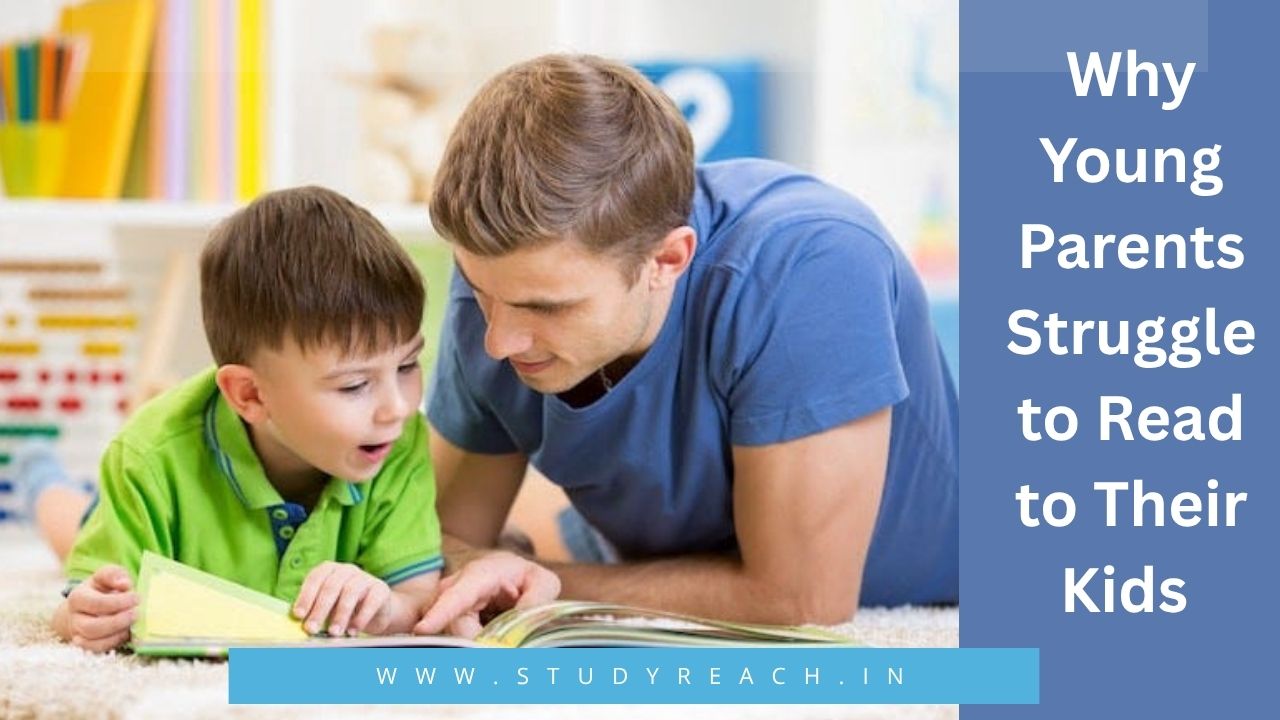Why Young Parents Struggle to Read to Their Kids—And Why It Matters
Shailendra Porwal
- June 9, 2025
- 7 min read
- 118 Views

Screen time is replacing story time, and children’s learning is suffering. Here’s why reading aloud is crucial and how parents can make it enjoyable.
The Shift from Books to Screens
Reading bedtime stories used to be a cherished tradition, but today, many young parents find it boring, time-consuming, or difficult because their kids won’t sit still.
A growing trend shows that fewer parents enjoy reading themselves, so they’re less likely to read to their children. With smartphones and tablets everywhere, kids prefer watching videos instead of listening to a story.
This shift has a serious impact on children’s learning and development. Studies show that fewer children today read for fun, and many struggle with reading comprehension in school.
Why Reading Aloud Matters
Reading aloud to children isn’t just about entertainment—it plays a crucial role in their mental, emotional, and academic development. Here’s how:
1. Builds Vocabulary: Kids Who Hear Stories Daily Learn New Words Faster
Language development starts early, and children absorb words from their surroundings. When parents read aloud, kids hear new words in context, making it easier for them to understand and remember.
For example – a child who listens to a story about a jungle might learn words like canopy, predator, camouflage, and habitat. These words might not come up in daily conversations, but books introduce them naturally.
Why is vocabulary important?
- A rich vocabulary helps children express themselves better.
- It improves their ability to understand school lessons.
- Strong vocabulary skills lead to better reading comprehension, which is essential for success in all subjects.
Tip for Parents:
Choose books with colorful illustrations and simple sentences. Pause while reading to explain new words or ask your child what they think a word means.
2. Improves Focus: Reading Helps Children Concentrate Better Than Watching Screens
Many parents struggle with getting their kids to sit still and focus. But reading aloud can train their brains to concentrate for longer periods.
Unlike videos, which provide instant stimulation, books require active listening and imagination. When a child follows a story, they learn to focus on details, remember characters, and predict what happens next.
How does reading improve focus?
- It teaches patience—kids must wait to find out what happens next.
- It strengthens memory—children recall previous parts of the story to understand the current scene.
- It reduces distractions—unlike screens, books don’t have flashing lights or sudden noises.
Tip for Parents:
Start with short books and gradually increase reading time. If your child gets restless, ask them questions like, “What do you think will happen next?” to keep them engaged.
3. Encourages Imagination: Books Spark Creativity and Curiosity
Books transport children to different worlds—whether it’s a magical kingdom, a deep ocean, or outer space. Unlike TV shows, which show everything visually, books encourage kids to picture scenes in their minds.
For example – when reading Alice in Wonderland, a child imagines the Mad Hatter’s tea party, the talking rabbit, and the magical doors. This mental exercise strengthens creativity and problem-solving skills.
Why is imagination important?
- It helps children think outside the box.
- It encourages curiosity—kids ask questions and explore new ideas.
- It boosts storytelling skills—children who read often can create their own stories.
Tip for Parents:
After reading a story, ask your child to draw a scene from the book or make up an alternate ending. This keeps their imagination active.
4. Develops Emotional Intelligence: Storytelling Teaches Empathy by Helping Children Understand Different Feelings and Perspectives
Emotional intelligence (EQ) is just as important as academic success. Books help children understand emotions, relationships, and different perspectives.
For example – reading The Blue Umbrella by Ruskin Bond teaches kindness and generosity. Stories about friendship, loss, bravery, and teamwork help kids relate to emotions they might not have experienced yet.
How does reading improve emotional intelligence?
- It teaches empathy—kids learn to see the world from another person’s perspective.
- It helps with emotional regulation—children understand feelings like sadness, anger, and joy.
- It builds social skills—kids learn how characters interact and resolve conflicts.
Tip for Parents:
Choose books with strong emotional themes. After reading, ask your child, “How do you think the character felt?” or “What would you do in this situation?”
Recommended Books for Kids
Here are some great books to start with:
Grandma’s Bag of Stories by Sudha Murty
- Sudha Murty’s Grandma’s Bag of Stories is a delightful read that captures the magic of childhood and the essence of traditional storytelling. This book is a collection of heartwarming tales, narrated by a grandmother to her grandchildren during their summer holidays. It is a perfect blend of nostalgia, wisdom, and entertainment, making it a must-read for children and adults alike.

The Blue Umbrella by Ruskin Bond
Ruskin Bond’s The Blue Umbrella is a timeless novella that captures the essence of simple joys, human desires, and the beauty of nature in the hills of India. First published in 1980, this heartwarming tale has continued to resonate with readers of all ages due to its universal themes of kindness, greed, and redemption.

Magic of the Lost Temple by Sudha Murty
- Discover the magic of the lost temple
Are you a curious reader, ready to explore the depths of the magic hidden in the lost temple of Karnataka? Are you ready to join Nooni as she travels around to discover the answers to her questions? If yes, then this book, ‘The Magic of the Lost Temple’ is a must have. Nooni is a city girl who is very surprised at the unexpected pace of life in her grandparent?s village in the state of Karnataka. Not being fazed with the turn of events, she engages herself in many of the odd jobs that are available in the village. She resorts to doing work like Papad making, organising enjoyable picnics, learning to ride a cycle and a long list of activities with her new found friends

The Role of Parents in Teaching Kids to Love Books
Reading is a lifelong habit, and parents play a huge role in shaping it. But with modern lifestyles, stress, and lack of time, it’s understandable why parents struggle. The key is to make reading enjoyable instead of forcing it.
Here’s how parents can make story time fun:
- Start Small: Read short, colorful books for just 5 minutes a day.
- Follow the Child’s Interest: Pick books on topics they enjoy—animals, space, or fairy tales.
- Use Expressions: Change your voice for different characters to make the story exciting.
- Talk About the Story: Instead of just reading, ask questions like, “What do you think happens next?”
- Limit Screen Time: Try reducing mobile or TV time gradually and replace it with reading.
Relaed Article and Video
Creating a Reading Culture in India
In India, education is highly valued, but reading for pleasure is still developing. Schools, libraries, and parents can work together to encourage reading habits in children. Community storytelling events, book clubs, and initiatives to make affordable children’s books available can help bring back the magic of reading.
By making reading a joyful activity, parents can help their kids become confident learners who do better in school and life.
Final Thoughts: A Call to Action
Reading aloud isn’t just about books—it’s about bonding, learning, and growing together. Parents, teachers, and society must work together to ensure children develop strong reading habits early on.

















1 Comment
This is really helpful.
And the books suggested are also very nice, very interesting and curiosity awaking.
Thankyou sir.